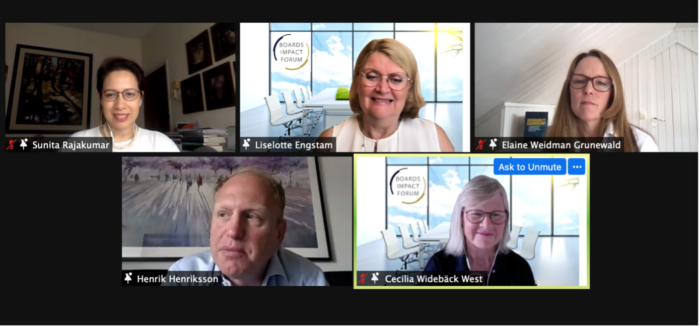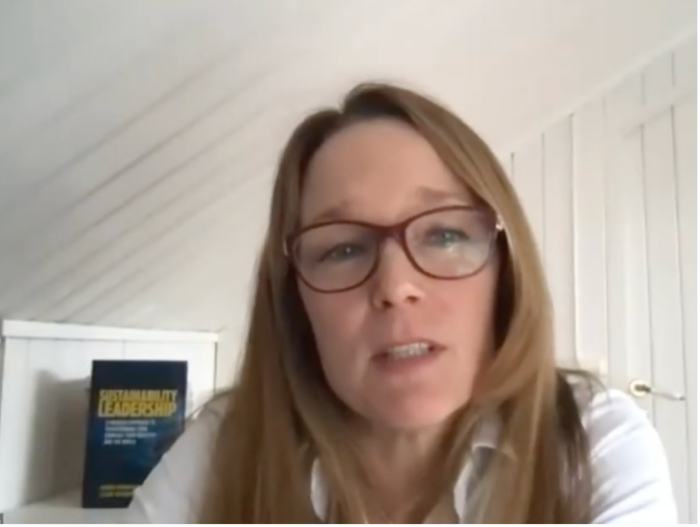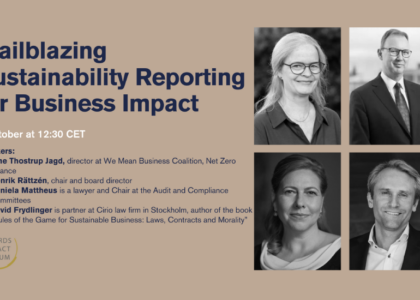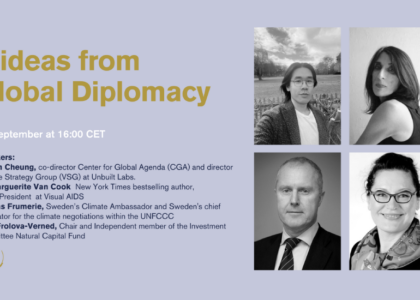Sustainability leadership: a Swedish approach to transforming your company, your industry and the world – with a Board view
Boards Impact Forum, the Nordic Chapter of WEF Climate Governance Initiative, recently hosted a discussion regarding sustainability imperatives at the board level. The event built on recent KTH & INSEAD research[1], which indicates that 60% of boards have not yet discussed how to engage on and consider sustainability, and 44% of board members surveyed say their companies have not yet integrated sustainability into their strategy.
The event featured Henrik Henriksson, CEO H2 Green Steel, NED Electrolux, former CEO Scania and Elaine Weidman Grunewald, NED Sweco, European Sustainable Growth Acquisition Corp, Azelio, and former Ericsson Sustainability Executive. The event drew on insights from Henrik’s and Elaine’s executive & board experience and their recent book Sustainability Leadership: A Swedish Approach to Transforming Your Company, Your Industry and the World (Palgrave MacMillan 2020). Together with Sunita Rajakumar, Founder of the Climate Governance Initiative Malaysia, we were able to include the Malaysia/ASEAN perspective as well.

A Swedish Approach to Transforming your company, your industry and the world, with a Board view.
Through their own working experience, as well as the some 25 interviews performed for their book, which was written for business leaders who want to increase their sustainability ambitions, Henrik and Elaine created a three step Sustainability Leadership model:
The Foundation: Discover your purpose, know your footprint, and build trust through responsible business.
The Core: Embed sustainability in your core business. Make it real by linking it to sales and customer value creation.
The Leap: Find your X-Factor. Adopt a societal and planetary lens, seek unconventional partnerships, and hone your influencing platform.
Their book is focused on this model, as well as the premise that sustainability leadership needs to start with a vision and a commitment to purpose driven business. Many companies begin their journey focused on how their brand is perceived, and this quickly becomes a reputation exercise. Elaine and Henrik flip that, and ask: what is your impact on society, is your company a force for good, and if not, what can you do to make it better?
“Many companies confuse their brand slogan with their purpose statement. This is not “purpose.” A purpose is the one thing that your company does better than others, it is the value you bring to society, beyond profit”
– Elaine Weidman Grunewald
The purpose-driven leadership is where it starts and ends, and it is about the tone from the top. Here the board can play a crucial role in encouraging the sustainability work. They can also encourage company leaders to put a stake in the ground, which means they need to voice the ambition on where the company is heading in terms of their core business, and their overall strategy.
“As a company, you should not have a sustainability strategy, but a sustainable strategy. And if sustainability is not connected to your sales, it is not real. You need targets that are relevant to sales”
– Henrik Henriksson
Henrik and Elaine shared typical issues faced by boards and stressed that sustainability needs to come into the board’s agenda.
Summary of typical issues facing boards by Elaine & Henrik
- How to increase the sustainability ambition
- How to get sustainability into strategy
- How should the board work with sustainability
- Do we have needed competence?
- Do we need a board committee?
- What ESG factors and how are they linked to the business model?
- Has the board linked the org goals and strategy directly to its governance focus and approach?
- What questions should boards ask the company?
- Are risk areas adequately addressed?
- Surveys and rankings – what disclosure frameworks should we consider?
Considering the growing focus on ESG, Environment, Social and Governance, that comes from both investors, customers and employees, all boards should be activating themselves on the topic of sustainability. However, boards and investors can be easily misled into a view that ESG can be reduced to a number.
“From the board perspective, ESG is not about a score, it’s more fundamental than that. You really need to do your homework”
– Elaine Weidman Grunewald
Henrik pointed out that the goals and targets must be both short and medium term in order to be relevant to the business and for management to be able to be accountable for them.
“A sustainability vision can be 2030 but the targets must be 2025 and earlier. Who in management will take responsibility for 2040 or 2050 targets?”
– Henrik Henriksson
Reflecting with a Malaysian and Asian perspective.
Sunita Rajakumar, Founder of the Climate Governance Initiative Malaysia, stressed that South East Asia, representing a third of global GDP, is an important part of the transition to a low-carbon economy. The region’s economic growth is fueled by coal, there are resource security challenges, and infrastructure development is resource intensive.

“Disclosure and reporting are not enough. We need to embed sustainability as part of business strategy. Boards need to work on climate governance, including executive compensation”
– Sunita Rajakumar
Participant’s perspective and panel advice
During the event, which had 501 registered participants from 46 countries, largely board members, revealed that 67 % of companies do not have clear sustainability goals that drive business results.

The panel advised that boards now quickly need to increase their engagement on the topic.
The most basic piece of advice to board members to get started is to ask for a presentation from management on where they are on sustainability. The company can be very early on in their sustainability journey, or they can be advanced – there is a wide spectrum.

“It will be the job of the management to integrate sustainability in the strategy but as board member, if you are not seeing it reflected, ask the question and bring it on the agenda”
– Elaine Weidman Grunewald
One of key areas in the discussion should be unlocking the link between profitability and sustainability. As board member you can bring in good examples from other companies that you have read up on, even outside the industry.

“Many still believe there is a contradiction between profit and sustainability. It is the opposite. It is by bringing sustainability into the strategy that you transform to be profitable“
– Henrik Henriksson
The event wrapped up with a few additional key takeaways from Elaine and Henrik specifically for boards to consider when charting their company’s sustainability progression:
Elaine & Henrik’s Key Takeaways for Boards
- Be aware how the business is viewed through a sustainability & ESG lens, both opportunities and risks
- Ensure that your board discusses how to engage on sustainability
- Avoid only approving a sustainability report – get into the strategy
- Make a plan – start with the basics, move to core, and then take the leap
- Ensure regular/quarterly performance updates includes sustainability performance
- Sustainability visions can be 2020 but targets need to be 2025
- Connect the GRC work to Sustainability (audit committee)
- Onboard new board members, and diversify the board to ensure strategic understanding of the issues
- Know your key stakeholders’ position on sustainability and ESG
Blogpost by Boards Impact Forum and the presenters
To order, or for more information on the book “Sustainability Leadership: A Swedish Approach to transforming your company, your industry and the world” by Henrik Henriksson and Elaine Weidman Grunewald, visit the website https://www.sustainabilityleadershipbook.com
To learn more and join Boards Impact Forum:
Upcoming webinars at Boards Impact Forum Our Events – Boards Impact Forum
Joining as member or to receive the newsletter Join the Forum – Boards Impact Forum
The full presentation from the event can be found here
The recording from the webinar can be found here
Take the KTH & INSEAD research survey here, and get a summary report
Climate Governance Initiative Malaysia https://www.cgmalaysia.com
[1] Magnusson vDHeyden Engstam Torre, Boards’ Contribution to Corporate Renewal Incl. Sustainability, 2017-21.








Recent Comments